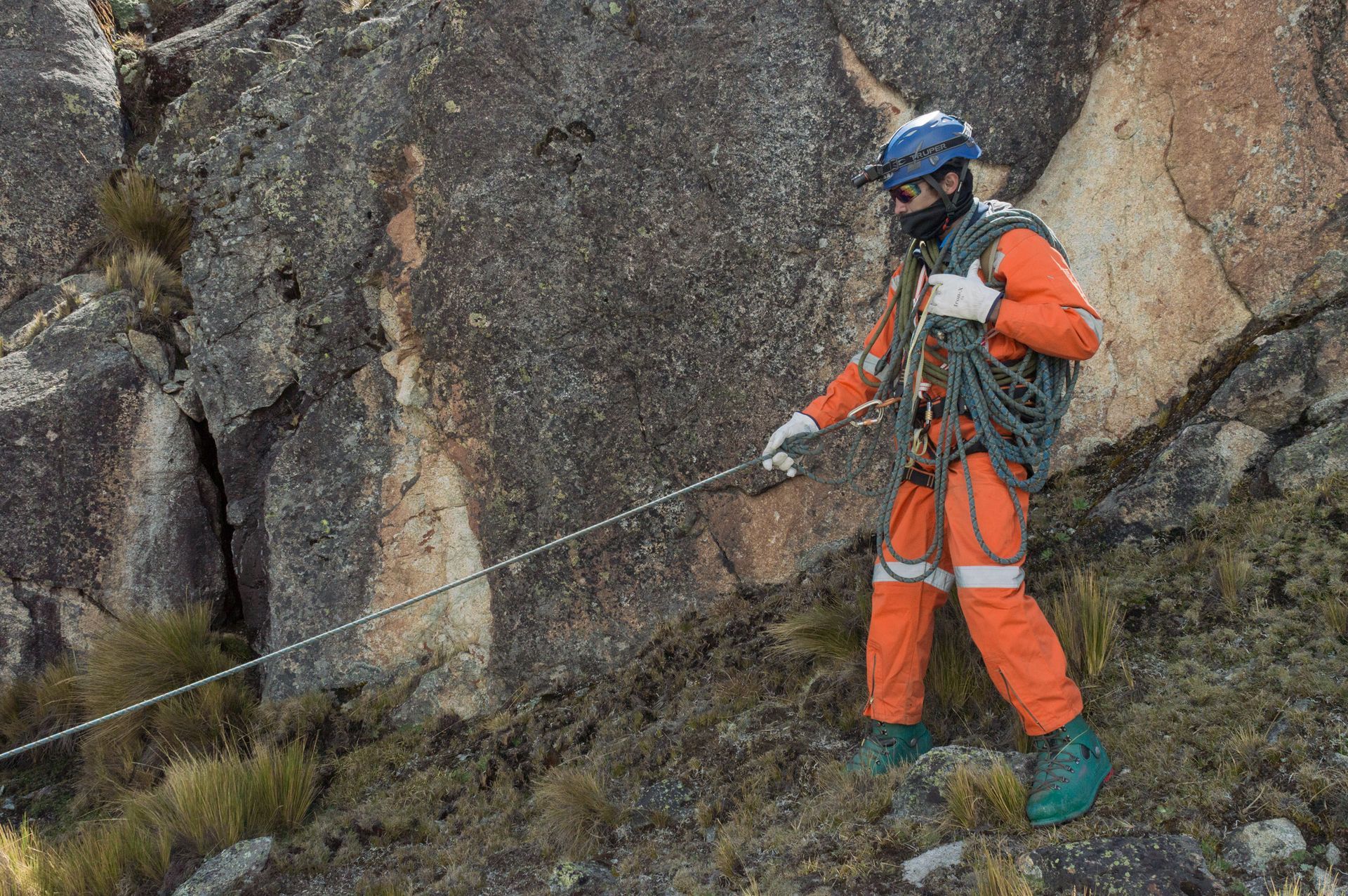Construction Industry Safety Training

Construction Industry Safety Training: Why It’s Non-Negotiable & How Dangle Academy Delivers It
In an era of rising complexity, construction industry safety training is more essential than ever. High-profile infrastructure projects, renewable energy installations, and urban regeneration all push workers into higher, more challenging, and riskier environments. Effective construction industry safety training helps avoid accidents, protects reputation, ensures compliance, and builds project resilience.
At Dangle Academy, we specialise in delivering integrated, practical, and accredited construction industry safety training across three pillars: IRATA Rope Access Training, Train the Painter Certification, and Workplace Health and Safety courses. In this blog, we’ll deepen the conversation, showing how to weave safety training into every stage of a project lifecycle and how at Dangle Academy we support that, as safety training underpins every successful scope of work.
By the end, you’ll see that construction industry safety training is not simply a add-on, it’s central to how you deliver successful, safe construction site management.
Why Construction Industry Safety Training Must Be a Priority
Legal & Regulatory Mandates
Any serious discussion of construction industry safety training must begin with the law. Under the Health and Safety at Work etc. Act 1974, employers must provide “such information, instruction, training and supervision as is necessary to ensure the health and safety of employees.” For construction specifically, the Construction (Design and Management) Regulations 2015 (CDM 2015) impose duties on clients, designers, contractors and workers to integrate safety from design phases through to handover.
Additionally, HSE’s published guidance Managing Health and Safety in Construction (L153) and Health and Safety in Construction (HSG150) codify expectations for planning, control, and training. Thus, every serious construction firm must embed construction industry safety training into business practice, not just offer it as a one-off induction.
Tactical Benefits & Risk Reduction
Well-executed safety training yields clear, measurable returns:
- Fewer accidents, near misses, and lost workdays
- Reduced insurance premiums and claims
- Improved project continuity and fewer disruptions
- Better team morale and retention
- Client confidence and stronger reputation
In short, construction industry safety training pays dividends well beyond compliance.
Key Hazards Addressed by Construction Safety Training
Below is a non-exhaustive set of common construction risks and how safety training counters them:
- Falls from height / working at height
- The single greatest cause of serious injury on site. Training in rope access, fall arrest systems, safe edge protection, and rescue can dramatically reduce this risk.
- Falling tools / dropped objects
- Proper tool tethering, exclusion zones, and anchor points prevent injuries below.
- Manual handling injuries
- Poor lifting, pushing, and twisting lead to musculoskeletal harm unless mitigated by proper training.
- Machinery / plant / electrical hazards
- Training around isolation, lockout, inspection, and safe operation is vital.
- Chemical hazards (COSHH, solvents, dusts)
- Workers must understand exposure control, PPE, and storage.
- Confined space risk
- Recognition and safe procedure training protect entrants.
- Fire risk, emergencies, evacuation
- Everyone on site must know basic fire safety, routes, and responsibilities.
Robust construction industry safety training needs to address all of these foundations rather than focusing on just one area. For more reading on HSE’s breakdown of construction site hazards, visit the https://www.hse.gov.uk/construction/safetytopics/index.htm
How Dangle Academy Delivers Construction Industry Safety Training That Works
Here’s how Dangle Academy’s core offerings align with real needs in construction industry safety training.
IRATA Rope Access Training: Elevating Safety at Height
Construction industry safety training is incomplete without working-at-height competence. Dangle Academy’s IRATA Rope Access Training equips technicians with safe access, positioning, and rescue skills. Rope access is recognised globally as one of the safest and most efficient methods for performing tasks at height, particularly in the construction, industrial, and renewable energy sectors.
According to IRATA International, rope access is “a safe method of working at height where ropes and associated equipment are used to gain access and from the work position… with minimal accidents, incidents or dangerous occurrences.”
By enrolling in IRATA courses, participants gain:
- Safe system of work procedures
- Rigging and anchor management skills
- Self-rescue and partner rescue capability
- Equipment inspection and maintenance knowledge
- Documentation and compliance awareness
For construction projects where scaffolding or MEWPs present higher risk or cost, rope access is often the safer and more efficient choice. Through construction industry safety training like IRATA certification, workers gain both technical ability and the safety mindset essential to modern construction.
Train the Painter Certification: Protecting Surfaces & Structures
While rope training deals with access, construction industry safety training must also preserve the integrity of materials and surfaces.
The Train the Painter Certification, delivered exclusively by Dangle Academy in Northern Ireland, provides internationally recognised coatings and surface preparation training. Operatives learn how to apply protective coatings safely and effectively, using methods that reduce environmental impact and health risks.
The programme covers:
- Surface preparation and contamination control
- Coating systems and specifications
- Safe use of abrasive blasting and intumescent materials
- Environmental, health, and PPE standards
Poor coating or surface protection can compromise structural strength and lead to unsafe conditions — particularly in steel structures, bridges, or offshore assets. By investing in construction industry safety training through Train the Painter, employers can ensure that coatings are applied safely, extending the life and safety of their assets.
Workplace Health & Safety Courses: Foundations for Every Role
No matter how strong your rope access or coating training is, the foundation of safety lies in everyday awareness. Dangle Academy’s Workplace Health and Safety Courses include:
- Manual Handling Awareness
- COSHH Awareness
- Fire Safety Awareness
- Confined Space Awareness
- Working at Height Awareness
- Mental Health Awareness
- First Aid at Work - 3 Days
- Emergency First Aid at Work - 1 Day
- Abrasive Wheels
- Workplace Risk Assesment
- Safety Harness Inspection & User Awareness
Each course aligns with Northern Ireland and UK legislation, including the Manual Handling Operations Regulations (NI) 1992, the Control of Substances Hazardous to Health Regulations (NI) 2003, and the Work at Height Regulations (NI) 2005. These short, accessible programmes ensure that every site role — from operatives to supervisors — shares a baseline of construction industry safety training. This not only improves compliance but also strengthens teamwork and awareness on site.
Integrating Training Into the Construction Lifecycle
To truly realise the benefits of construction industry safety training, it must be embedded into the entire project lifecycle — not delivered reactively after incidents occur.
Design & Planning Stage
- Identify potential hazards early and design out risks.
- Specify safety training requirements in tender documents.
- Schedule training for key personnel before mobilisation.
Construction Phase
- Begin with structured inductions and ongoing toolbox talks.
- Use scenario-based exercises to reinforce key safety principles.
- Encourage open reporting and feedback to continuously improve safety standards.
Post-Construction & Maintenance
- Maintain competence through refresher training and upskilling.
- Use trained rope access and coatings professionals for inspections and repairs.
- Continue promoting a culture of safety long after handover.
By integrating construction industry safety training into every phase, safety becomes part of the project’s DNA — not an afterthought.
Modern Challenges and the Future of Construction Safety
The construction industry is changing fast — with new materials, technologies, and environmental targets reshaping the way we work. But one constant remains: safety is non-negotiable.
Emerging challenges include the increasing demand for rope access in renewable energy and high-rise urban construction, a greater awareness of mental health and wellbeing in the workplace and an integration of digital safety tools such as wearable technology, sensors and VR simulations for training.
At Dangle Academy, we are committed to staying ahead of these changes. Our training programmes evolve with industry standards, ensuring that professionals remain competent, compliant, and confident in every scenario.
How to Choose the Right Construction Industry Safety Training Provider
When selecting a safety training provider, consider:
Accreditation:
- Recognised by industry bodies such as IRATA or Corrodere Academy
Experience:
- Trainers with real-world industry backgrounds
Facilities:
- Purpose-built, practical environments that replicate real work scenarios
Comprehensive Offering:
- Access, coatings, and safety courses under one roof for consistent standards
Dangle Academy meets and exceeds all these benchmarks. With a purpose-built facility in the city of Belfast and a team of experienced instructors, we are proud to deliver construction industry safety training that sets a new standard for professionalism and safety culture in Northern Ireland and beyond.
Why Choose Dangle’s Academy?
Here at Dangle, we pride ourselves on offering a wide range of professional and comprehensive inspection, access, coatings, and composite (IACC) industrial services and construction industry safety training courses to cater to the needs of both the private and public sectors. Our dedication to providing high-quality work at height solutions and training has helped us establish a strong reputation in the industry.
With a team of highly skilled and experienced professionals, we are committed to delivering exceptional results that not only meet but exceed our clients' expectations. Our on-site working at height services are designed to minimise maintenance costs in the long and short-term, allowing our clients to save on valuable resources.
Located in Belfast, Northern Ireland, our headquarters serve as the centre of our operations across Ireland. However, we also have a Dangle office based in Scotland, ensuring that we can extend our services to a wider clientele across the United Kingdom. No matter where you are located, our team is always ready to assist you with your industrial maintenance or training needs.
If you would like to learn more about how our dedicated team can help you, we encourage you to get in touch with us today. Our friendly and professional staff are always available to provide you with the information and support you require.


